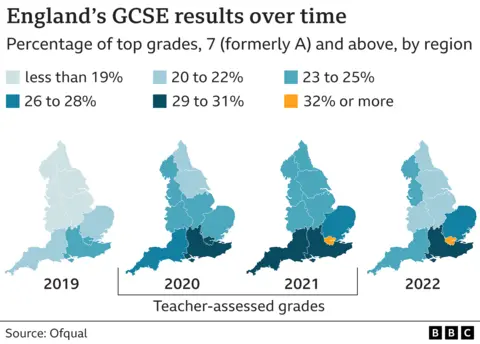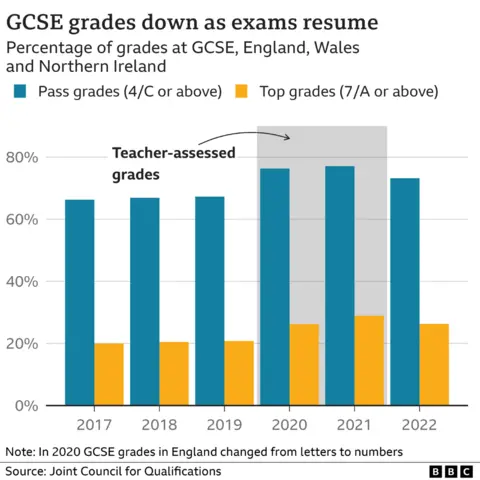GCSE results: Grades show growing regional divide in England
Regional differences in the proportion of top GCSE grades have become more prominent in England since Covid.
Just under a third of GCSE grades were 7/A and above in London, compared to just over a fifth in the North East and in Yorkshire and the Humber.
The gap between the regions with the highest and lowest proportions of top grades is 0.9 percentage points wider than it was in 2019.
Some Level 2 BTec pupils who were due to get results are facing delays.
Across England, Wales and Northern Ireland, students have been receiving results for GCSE, BTec and other vocational and technical awards.
Overall, 73.2% of GCSEs were marked at grades 4/C and above this year, down from 77.1% in 2021, when grades were based on teachers' assessments.
It is still substantially higher than in 2019, the last year exams were sat before Covid, when it was 67.3%
The proportion of top grades - 7/A and above - is 26.3%. Again, that is higher than 2019 (20.8%) and lower than 2021 (28.9%).
Ofqual, England's exam watchdog, took the decision to reach this "midway point" in the "interests of fairness" to students whose education was disrupted.
Similar plans were put in place for Northern Ireland and Wales.
In Scotland, where pupils received their exam results on 9 August, the pass rate at National 5 level fell to 80.8% - down from 85.8% in 2021.

'So proud'
By Shona Elliott
 BBC/ Shona Elliott
BBC/ Shona ElliottIbrahim, who is 16 and studied at The Deanery Church of England High School in Wigan, is heading off on holiday after receiving top grades on Thursday.
The hard-working student is already thinking about his A-levels, but his mum, Howayda, plans to make sure he enjoys a well-deserved break before he starts studying again.
"He will spend all day today [Thursday] with friends, and then tomorrow we will go to Dublin to give him a nice holiday so he can start the next year motivated," she says.
Howayda is also looking forward to relaxing on holiday now the worry of expecting exam results is finally over.
"I am so happy today, but yesterday I did not sleep the whole night," she says.
"Home schooling was a bad time for all of us. Studying online is not like going to school. It was a horrible time for us all but today I am so happy and so proud."


'Untenable'
Students in Northern Ireland achieved the highest proportion of top grades, with 37% of entries given an A or A*. The comparable figure was 26% in England and 25.1% in Wales.
Fiona Spellman, chief executive of education charity Shine, which supports disadvantaged children in northern England, co-wrote an open letter warning about "disproportionate learning loss" suffered by students during Covid.
She told the BBC that regional inequalities already existed but were reaching an "untenable situation" that would affect younger year groups, too - and that teachers needed more resources.
Labour said the Conservative government had "failed" children, while the Liberal Democrats claimed it "deserved an 'F' for letting down these pupils".
Will Quince, schools minister in England, told the BBC: "Every year up until the pandemic, we did see the attainment gap reduce, but the pandemic has had an impact, we know it has."
It was up to the government and schools to address these inequalities, he told BBC Radio 4's Today programme.
Meanwhile, exam board Pearson said on Thursday that 5,700 students taking BTec Level 2 - a similar standard to GCSEs - were "ineligible" to get their results, down from 7,000 on Wednesday.
Last week, Pearson apologised to students taking BTec Level 3s - a similar standard to A-levels - after some faced delays in getting their results.

Special measures were introduced for this year's GCSEs to counteract the disruption to learning that pupils experienced.
The grade boundaries - the number of marks needed for each grade - are more lenient this year than before the start of the pandemic.
Pupils also had advance information about exam content, a choice of topics in some subjects, and additional resources in certain exams.
However, it was not a smooth process for everybody, and Ofqual criticised exam boards after pupils were tested on topics they were told would not come up, and sat papers containing mistakes.
The Association of School and College Leaders said the fall in grades this year was "no reflection on the performance of pupils".
Geoff Barton, its general secretary, said "the vast majority of pupils will be able to take their next step as planned" into further education or training, and advised anyone who was disappointed to speak to their teachers.
As is the case every year, girls outperformed boys across all subjects.
In England, where the GCSE grading system changed from letters to numbers in 2018, students need to pass GCSE maths and English with grade 4 or above to qualify for further study.
The fall in the pass rate will lead to more compulsory resits of these subjects - which can be carried out alongside those further studies - compared with the last two years.
The same "midway point" marking approach applied to this year's A-levels - where the proportion of top grades was down from last year but higher than 2019.

Are you having to rethink your plans after getting your results? Do you have questions you'd like answered? Email [email protected].
Please include a contact number if you are willing to speak to a BBC journalist. You can also get in touch in the following ways:
- WhatsApp: +44 7756 165803
- Tweet: @BBC_HaveYourSay
- Upload your pictures/video here
- Or fill out the form below
- Please read our terms & conditions and privacy policy
If you are reading this page and can't see the form you will need to visit the mobile version of the BBC website to submit your question or comment or you can email us at [email protected]. Please include your name, age and location with any submission.

